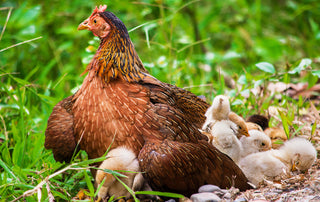To me Mothering Sunday increasingly seems to focus on mothers in a way that is, as far as cards go, soft and sentimental. There’s nothing wrong with this but there are other deeper and harder aspects to mothering. I was reminded of this in reading a fascinating saying of Jesus found in Matthew 23:37 (NIV): ‘Jerusalem, Jerusalem, you who kill the prophets and stone those sent to you, how often I have longed to gather your children together, as a hen gathers her chicks under her wings, and you were not willing.’ (It occurs almost identically in Luke 13:34.)
The setting is clear. Jesus is sadly lamenting how the people have rejected both God in the past and him in the present and, in doing so, he uses a wonderful image of motherhood well worth pondering.
Jesus uses a picture – as so often with him, drawn from nature – of a mother hen with her chicks scattered around her who suddenly becomes aware of danger. With most threats she would probably simply usher the chicks away to safety, but what Jesus is referring to is when some predatory bird, such as an eagle, appears in the sky above. Instantly, the mother hen summons her chicks and hides them under her outstretched wings. Now, if the eagle swoops, it will take her rather than her offspring. The idea of a threatening bird would have struck a chord with Jesus’ hearers. As the symbol of Rome, the eagle was already circling ominously over Jerusalem and a mere 40 years later Rome would destroy the temple and the city. In those uncertain and threatening times – not perhaps unlike our own – Jesus uses this wonderful and very motherly image to explain God’s attitude to his people. Note the following . . .
First, the hen as a mother is utterly committed to her children. Even while searching for food for herself, the mother is constantly looking around to watch her brood and, at the same time, scanning the sky for threatening silhouettes. Her absolute and unwavering priority is her young. Human mothers can identify with this. At the risk of gender stereotyping, you see it well in places like airport queues: while the father can act as if he has completely forgotten whether he brought the children at all, the mother is desperately concerned to know the location of each child to centimetre-level precision. Here mothers model how God reacts to those who have trusted in him. This is found in the Old Testament where we read, ‘Can a mother forget the baby at her breast and have no compassion on the child she has borne? Though she may forget, I will not forget you!’ (Isaiah 49:15 NIV). God is committed to those who trust him in Christ.
Second, the hen as a mother is lovingly concerned for her children. The mother hen is not merely focused on the observation of her children, but in their preservation. At the first hint of a threat she summons them urgently under her outstretched wings. Again, every mother can identify with this. We have often seen children being tugged in tight under extended arms. In the Parable of the Lost Son (Luke 15:11-32), we read that it is the father who, in remarkable defiance of culture and custom, ‘ran to his son, threw his arms around him and kissed him’ (v.20 NIV). Had Jesus said this of the mother no one would have found it remarkable! Of course that maternal loving concern can be overdone, but I think we need to worry less about over-protective mothers than under-protective ones. And here, of course, looking beyond mothers, we see a God who cares for those who have trusted him in Christ.
Third, the hen as mother sacrificially covers her children. Alone, a hen faced with an approaching eagle would probably run for cover or, hoping to be unobserved, crouch down in the dust. Yet with her chicks, she stays and extends her wings over them and in so doing makes herself a bigger target. It is an action that in human terms says, ‘If you must attack, take me, not my children.’ Again, mothers can identify with this principle of sacrificial protection. We all know stories – and we may have been part of them – where a mother has paid the price for the care, or the repair, of their children’s lives. Here, too, we see beyond mothering in hens or humans. We see the God who comes to the cross in Jesus and under whose outstretched arms protection can be found for those who seek it.
Yet as an evangelist I must add a final word. This statement of Jesus is tragic because it ends with that moving phrase ‘you were not willing’. In the most motherly of ways God offers his protection to us through Jesus. It’s free and it’s available – but are you willing?




